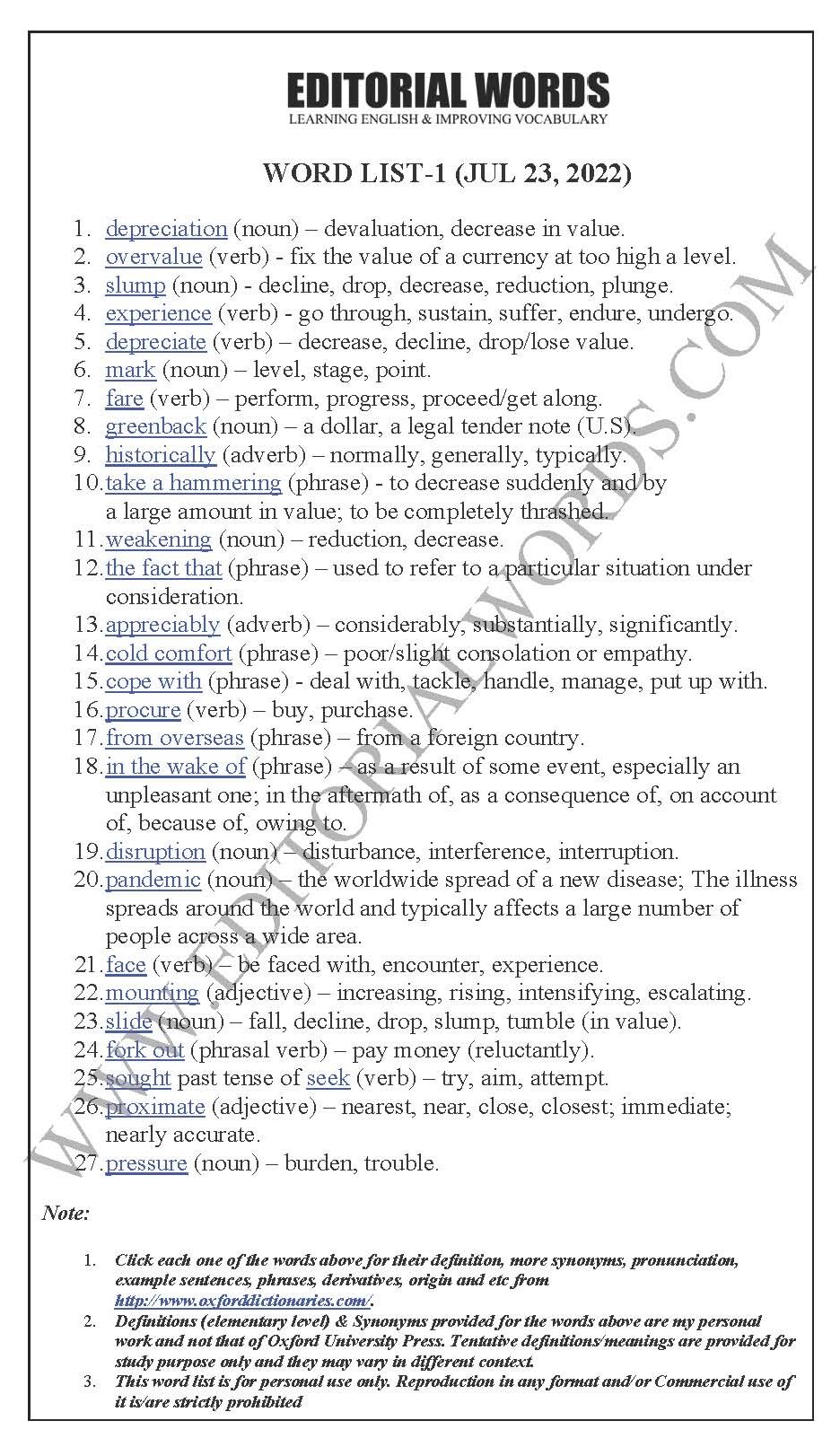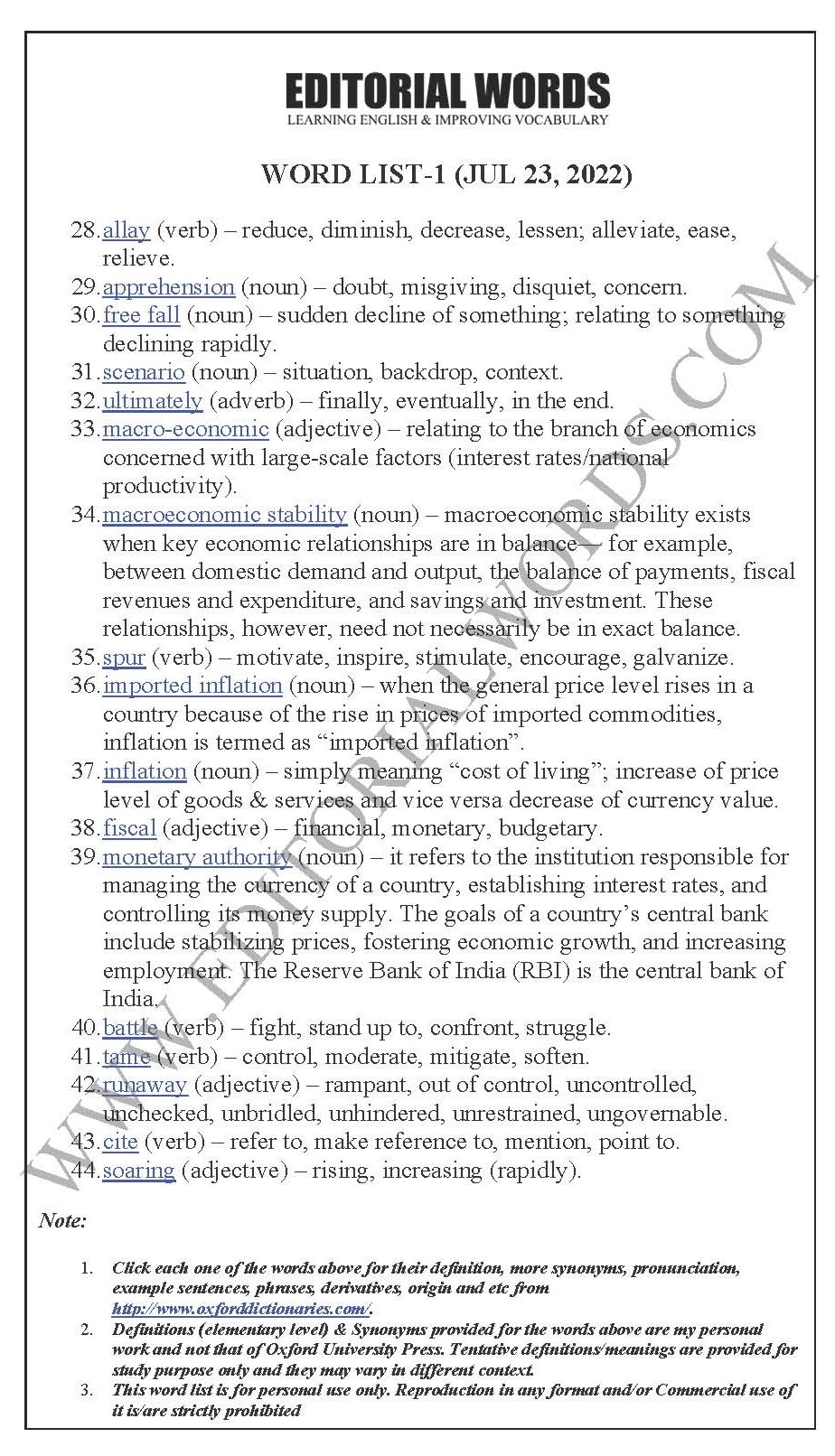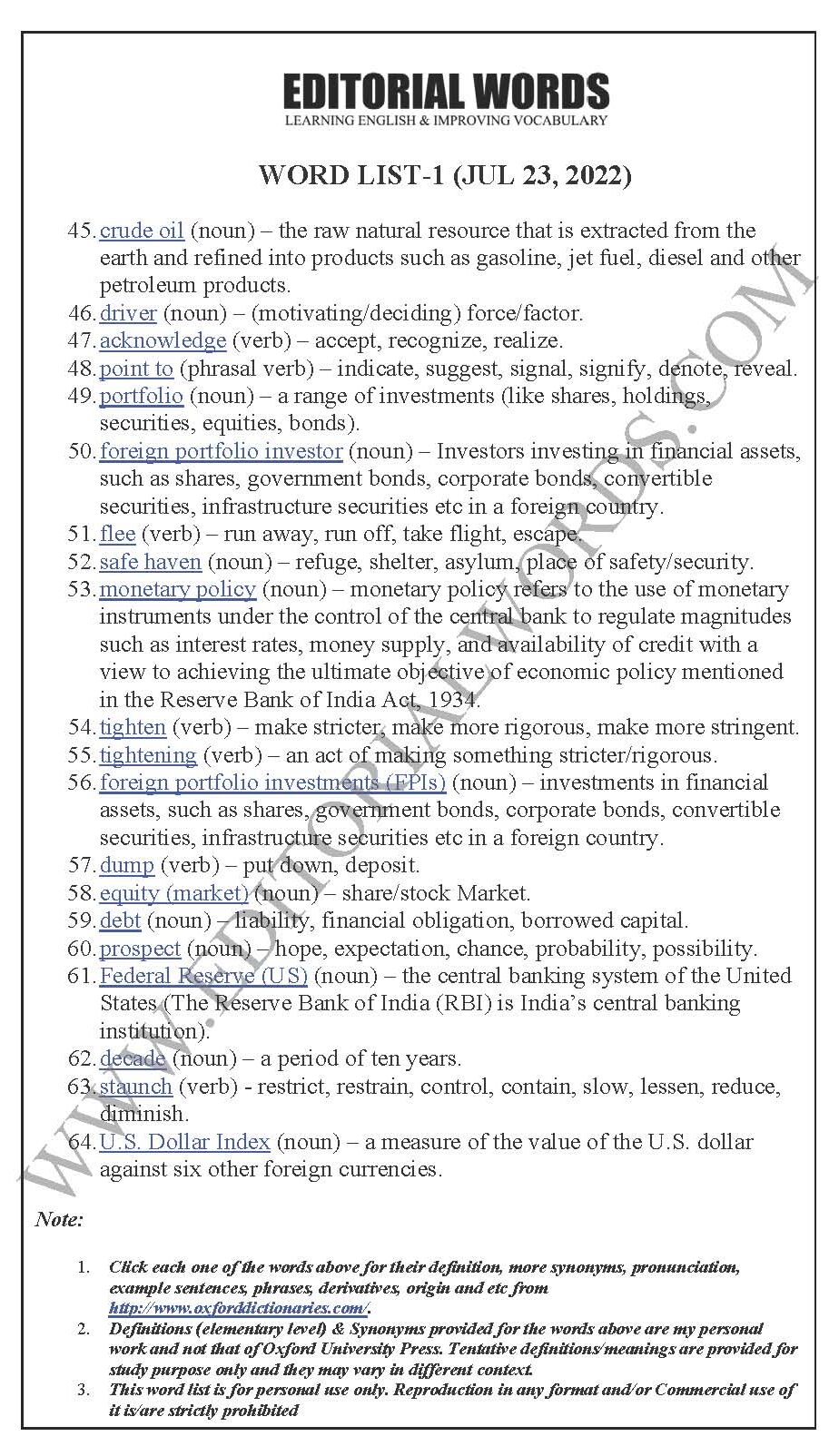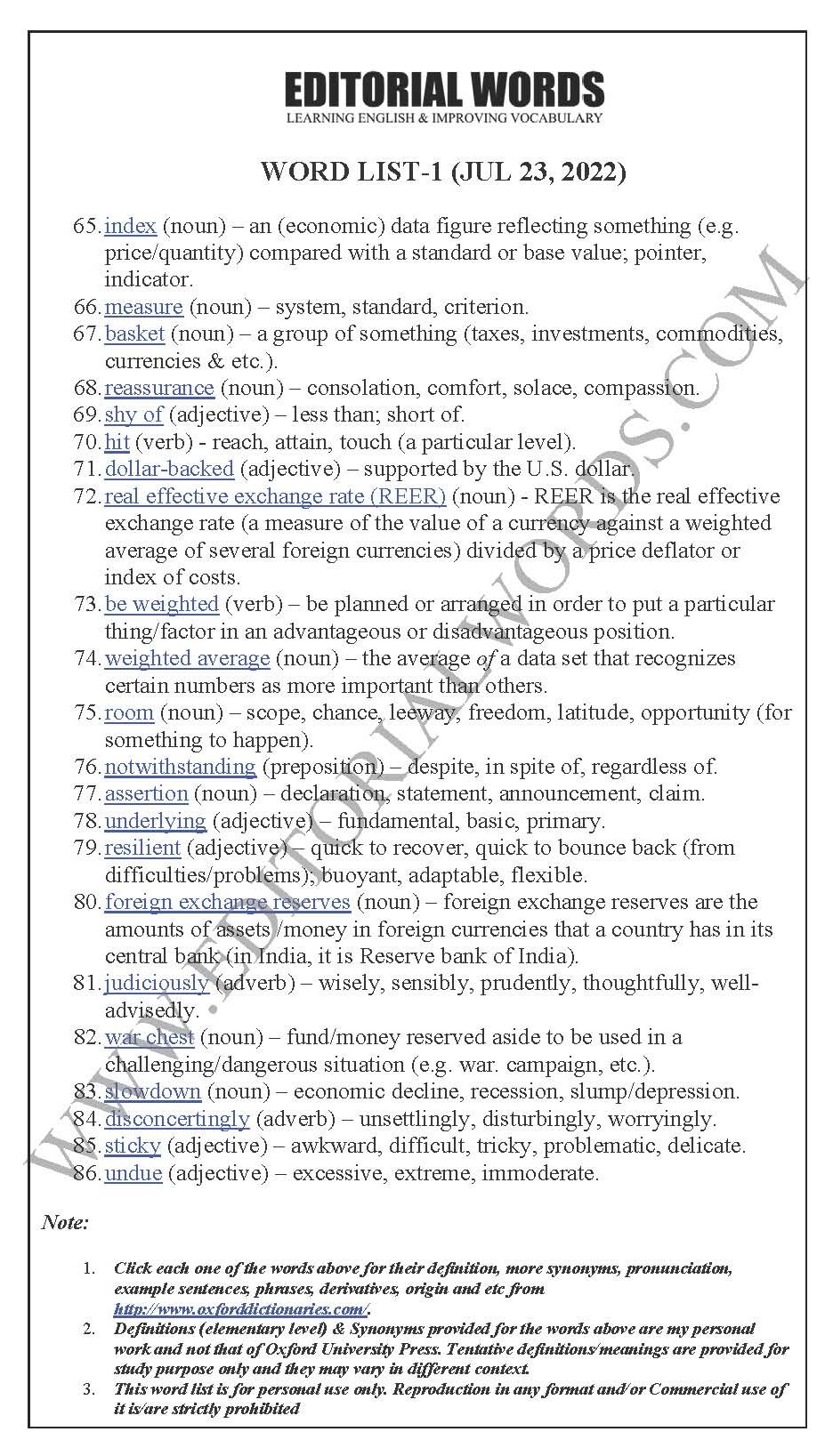The Hindu Editorial (Currency caution) – Jul 23, 2022
The Indian rupee is experiencing its worst slump in four years. Since the start of 2022, the currency has depreciated by more than 7% against the U.S. dollar,… For further reading, visit “The Hindu”. Below is today’s word list-1 for The Hindu Editorial (Currency caution) – Jul 23, 2022.
To read this article, click “The Hindu”.
This preview is provided here with permission.
Courtesy: The Hindu
The Hindu Editorial (Currency caution) – Jul 23, 2022:
- depreciation (noun) – devaluation, decrease in value.
- overvalue (verb) – fix the value of a currency at too high a level.
- slump (noun) – decline, drop, decrease, reduction, plunge.
- experience (verb) – go through, sustain, suffer, endure, undergo.
- depreciate (verb) – decrease, decline, drop/lose value.
- mark (noun) – level, stage, point.
- fare (verb) – perform, progress, proceed/get along.
- greenback (noun) – a dollar, a legal tender note (U.S).
- historically (adverb) – normally, generally, typically.
- take a hammering (phrase) – to decrease suddenly and by a large amount in value; to be completely thrashed.
- weakening (noun) – reduction, decrease.
- the fact that (phrase) – used to refer to a particular situation under consideration.
- appreciably (adverb) – considerably, substantially, significantly.
- cold comfort (phrase) – poor/slight consolation or empathy.
- cope with (phrase) – deal with, tackle, handle, manage, put up with.
- procure (verb) – buy, purchase.
- from overseas (phrase) – from a foreign country.
- in the wake of (phrase) – as a result of some event, especially an unpleasant one; in the aftermath of, as a consequence of, on account of, because of, owing to.
- disruption (noun) – disturbance, interference, interruption.
- pandemic (noun) – the worldwide spread of a new disease; The illness spreads around the world and typically affects a large number of people across a wide area.
- face (verb) – be faced with, encounter, experience.
- mounting (adjective) – increasing, rising, intensifying, escalating.
- slide (noun) – fall, decline, drop, slump, tumble (in value).
- fork out (phrasal verb) – pay money (reluctantly).
- sought past tense of seek (verb) – try, aim, attempt.
- proximate (adjective) – nearest, near, close, closest; immediate; nearly accurate.
- pressure (noun) – burden, trouble.
- allay (verb) – reduce, diminish, decrease, lessen; alleviate, ease, relieve.
- apprehension (noun) – doubt, misgiving, disquiet, concern.
- free fall (noun) – sudden decline of something; relating to something declining rapidly.
- scenario (noun) – situation, backdrop, context.
- ultimately (adverb) – finally, eventually, in the end.
- macro-economic (adjective) – relating to the branch of economics concerned with large-scale factors (interest rates/national productivity).
- macroeconomic stability (noun) – macroeconomic stability exists when key economic relationships are in balance— for example, between domestic demand and output, the balance of payments, fiscal revenues and expenditure, and savings and investment. These relationships, however, need not necessarily be in exact balance.
- spur (verb) – motivate, inspire, stimulate, encourage, galvanize.
- imported inflation (noun) – when the general price level rises in a country because of the rise in prices of imported commodities, inflation is termed as “imported inflation”.
- inflation (noun) – simply meaning “cost of living”; increase of price level of goods & services and vice versa decrease of currency value.
- fiscal (adjective) – financial, monetary, budgetary.
- monetary authority (noun) – it refers to the institution responsible for managing the currency of a country, establishing interest rates, and controlling its money supply. The goals of a country’s central bank include stabilizing prices, fostering economic growth, and increasing employment. The Reserve Bank of India (RBI) is the central bank of India.
- battle (verb) – fight, stand up to, confront, struggle.
- tame (verb) – control, moderate, mitigate, soften.
- runaway (adjective) – rampant, out of control, uncontrolled, unchecked, unbridled, unhindered, unrestrained, ungovernable.
- cite (verb) – refer to, make reference to, mention, point to.
- soaring (adjective) – rising, increasing (rapidly).
- crude oil (noun) – the raw natural resource that is extracted from the earth and refined into products such as gasoline, jet fuel, diesel and other petroleum products.
- driver (noun) – (motivating/deciding) force/factor.
- acknowledge (verb) – accept, recognize, realize.
- point to (phrasal verb) – indicate, suggest, signal, signify, denote, reveal.
- portfolio (noun) – a range of investments (like shares, holdings, securities, equities, bonds).
- foreign portfolio investor (noun) – Investors investing in financial assets, such as shares, government bonds, corporate bonds, convertible securities, infrastructure securities etc in a foreign country.
- flee (verb) – run away, run off, take flight, escape.
- safe haven (noun) – refuge, shelter, asylum, place of safety/security.
- monetary policy (noun) – monetary policy refers to the use of monetary instruments under the control of the central bank to regulate magnitudes such as interest rates, money supply, and availability of credit with a view to achieving the ultimate objective of economic policy mentioned in the Reserve Bank of India Act, 1934.
- tighten (verb) – make stricter, make more rigorous, make more stringent.
- tightening (verb) – an act of making something stricter/rigorous.
- foreign portfolio investments (FPIs) (noun) – investments in financial assets, such as shares, government bonds, corporate bonds, convertible securities, infrastructure securities etc in a foreign country.
- dump (verb) – put down, deposit.
- equity (market) (noun) – share/stock Market.
- debt (noun) – liability, financial obligation, borrowed capital.
- prospect (noun) – hope, expectation, chance, probability, possibility.
- Federal Reserve (US) (noun) – the central banking system of the United States (The Reserve Bank of India (RBI) is India’s central banking institution).
- decade (noun) – a period of ten years.
- staunch (verb) – restrict, restrain, control, contain, slow, lessen, reduce, diminish.
- U.S. Dollar Index (noun) – a measure of the value of the U.S. dollar against six other foreign currencies.
- index (noun) – an (economic) data figure reflecting something (e.g. price/quantity) compared with a standard or base value; pointer, indicator.
- measure (noun) – system, standard, criterion.
- basket (noun) – a group of something (taxes, investments, commodities, currencies & etc.).
- reassurance (noun) – consolation, comfort, solace, compassion.
- shy of (adjective) – less than; short of.
- hit (verb) – reach, attain, touch (a particular level).
- dollar-backed (adjective) – supported by the U.S. dollar.
- real effective exchange rate (REER) (noun) – REER is the real effective exchange rate (a measure of the value of a currency against a weighted average of several foreign currencies) divided by a price deflator or index of costs.
- be weighted (verb) – be planned or arranged in order to put a particular thing/factor in an advantageous or disadvantageous position.
- weighted average (noun) – the average of a data set that recognizes certain numbers as more important than others.
- room (noun) – scope, chance, leeway, freedom, latitude, opportunity (for something to happen).
- notwithstanding (preposition) – despite, in spite of, regardless of.
- assertion (noun) – declaration, statement, announcement, claim.
- underlying (adjective) – fundamental, basic, primary.
- resilient (adjective) – quick to recover, quick to bounce back (from difficulties/problems); buoyant, adaptable, flexible.
- foreign exchange reserves (noun) – foreign exchange reserves are the amounts of assets /money in foreign currencies that a country has in its central bank (in India, it is Reserve bank of India).
- judiciously (adverb) – wisely, sensibly, prudently, thoughtfully, well-advisedly.
- war chest (noun) – fund/money reserved aside to be used in a challenging/dangerous situation (e.g. war. campaign, etc.).
- slowdown (noun) – economic decline, recession, slump/depression.
- disconcertingly (adverb) – unsettlingly, disturbingly, worryingly.
- sticky (adjective) – awkward, difficult, tricky, problematic, delicate, embarrassing.
- undue (adjective) – excessive, extreme, immoderate.
Note:
1. Click each one of the words above for their definition, more synonyms, pronunciation, example sentences, phrases, derivatives, origin and etc from http://www.oxforddictionaries.com/.
2. Definitions (elementary level) & Synonyms provided for the words above are my personal work and not that of Oxford University Press. Tentative definitions/meanings are provided for study purpose only and they may vary in a different context.
3. This word list is for personal use only. Reproduction in any format and/or Commercial use of it is/are strictly prohibited.
The Hindu Editorial (Currency caution) – Jul 23, 2022:




“Phrasal Verbs” We Learnt Last Week
“Idioms & Phrases” We Learnt Last Week
“Important Definitions” We Learnt Last Week
Recent Word Lists For The Hindu Editorial Articles

Be the first to comment